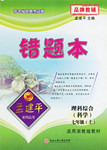题目内容
第四部分:书面表达(共两节,满分40分)
第一节:完成句子(共10小题;每小题1.5分,满分15分)
阅读下列各小题,根据括号内的汉语提示,用句末括号内的英语单词完成句子,并将答案写在答题卡上的相应题号后。
例:We______(起床)before dawn, it was still dark outside.(get)
答案:got up
71 He always _____________________(作弄) his classmates, which made them unhappy.( tricks)
72 Her mother was ill so she had to look after her _______________(夜以继日地).(day)
73 The boy __________________________(正盼望) being given a birthday present.(forward)
74 If you _________________(想要减轻体重) , here are some do’s and don’ts.(lose)
75 Don’t be tempted to cheat,--you’ll never ________________(被放过) it.(get)
76 Hard as he is working, he can only just _______________(维持生活).(earn)
77 _______________(说实话), I am not satisfied with what you did.(honest)
78 Trees used to _____________(被砍倒) for firewood in the past.(cut)
79 After having worked together for three years, they finally ________________(彼此相爱) . (fall)
80 We are worrying about ____________________(下一步我们该做什么).(what)
71 played tricks on 72 day and night 73 is looking forward to 74 want to lose weight
75 get away with 76earn a/his living 77 To be honest 78 be cut down
79 fell in love with each other 80 what we should do next
【解析】略

 灵星计算小达人系列答案
灵星计算小达人系列答案 孟建平错题本系列答案
孟建平错题本系列答案
第四部分:书面表达(共两节,35分)
第一节:情景作文(20分)
假设你是李华,在上周进行的研究性学习活动中,你班同学了解了珍稀动物金丝猴的相关信息。请根据下列表格所提供的内容,给你的笔友Peter写封信,向他介绍此次活动。
注意:
1.信的开头和结尾已为你写好。
2.词数不少于60。
提示词:研究性学习:inquiring learning 金丝猴:golden monkeys
| 第一组 | 第二组 |
| ●到动物园观察金丝猴的特征 | ●上网了解金丝猴的现有数量 |
| ●去图书馆查阅金丝猴的习性 | ●听专家介绍对金丝猴的保护措施 |
| ●汇总信息,完成报告 | |
| ●活动体会:学会合作;体验新的学习方式 | |
How have you been recently? I’m writing to tell you something about our inquiring learning on the rare animal—golden monlkeys.
The students of our class were divided into two groups.
______________________________________________________________________________________________________________________________________________________________
What do you think of our inquiring learning? Looking forward to your reply.
Best wishes,
Li Hua
第四部分: 书面表达(共两节, 满分35分)
第一节 填空 ( 共10小题;每小题1分, 满分10分)
阅读短文,根据所读内容在文后76--85的空格里填上适当的单词或短语, 并将答案转写到答题卡上。注意:每空不超过3个单词。
In many English homes four meals are served; they are breakfast, lunch, tea and dinner. These are the meals that are served in the homes of people who are well to do.
Breakfast may be served any time for seven to nine. It consist of porridge, bacon and eggs (boiled or fried), butter toast or bread-and-butter with marmalade (酸果酱). Instead of bacon and eggs, fish may be served. Either tea or coffee is drunk at breakfast.
Lunch comes at about one o’clock. It generally consists of cold meat (left over from yesterday’s dinner), potatoes, and salad. After that there is bread or biscuits and cheese. Most people drink water at lunchtime; some drink beer or wine. It is not the custom to drink the spirits (烈性酒) like whisky or brandy even wealthy homes in the middle of the day.
Afternoon tea, taken between four and five, is the most informal meal of the day. If you are a friend of the family you may drop in for tea without an invitation or telling them that you are coming. Each person has a cup and saucer, a spoon and a small plate for bread-and-butter and cake. By the way, do not help yourself to cake first; bread-and-butter first, and then cake if there is any. Another piece of advice: do not put more than one piece of bread or cake on your plate at the same time.
Dinner is the most substantial (丰盛的) meal of the day and is a very formal meal. Many people even wear special clothes for dinner, so if you are asked out of dinner you must find out whether you are expected to wear a dinner suit; for you would feel very embarrassed if, when you go there, you were the only person in ordinary clothes. Dinner is generally served at about half past seven. All the members of the family sit down together and are on their best behavior. The head of the family sits at one end of the table; his wife sits at the other. If there is a guest, he generally sits in the place of honor, which is at the right of lady of the house. If there are several guests the most important is asked to sit there. During the meal conservation is carried on, you should try to get into the conversation with the person on your right or left, but you should not try to talk to someone who is a long way from you.
Title: 76._______________________
|
77. ___________ |
79. _____________ |
Food |
Drinks |
Notes |
|
Breakfast |
7 to 9 a.m. |
Porridge, bacon & eggs, etc |
83. ________________ |
|
|
Lunch |
80. _____________ |
Cold meat, potatoes, salad, bread, biscuits & cheese |
84. ________________
|
|
|
Afternoon tea |
4 to 5 p.m. |
82. ______________________ |
tea |
85. __________ |
|
78. ___________ |
81. _____________ |
|
|
Most formal |




